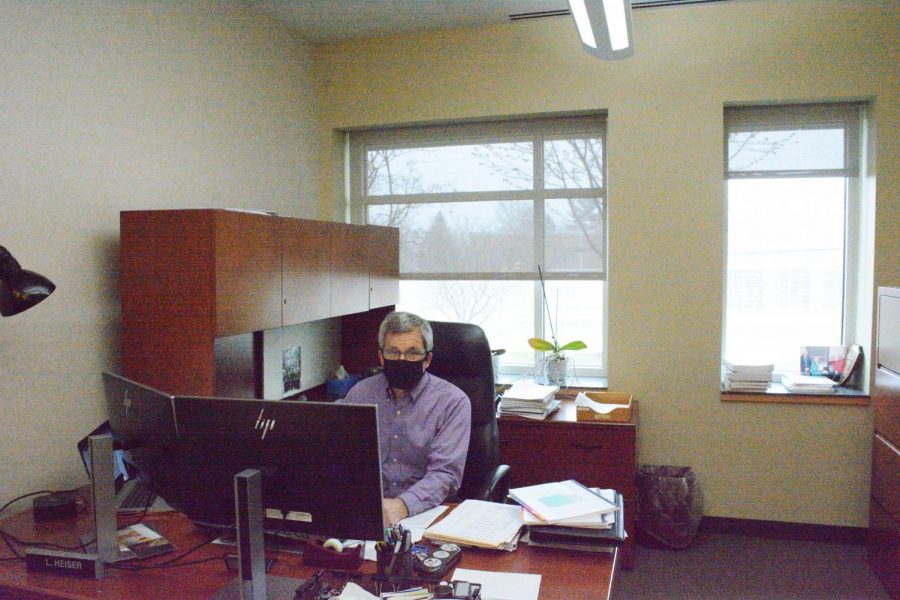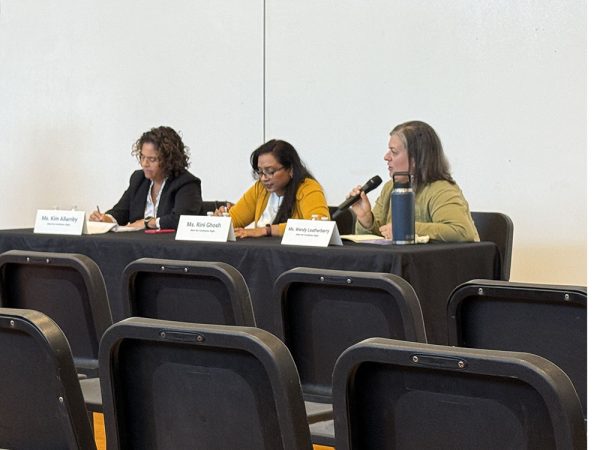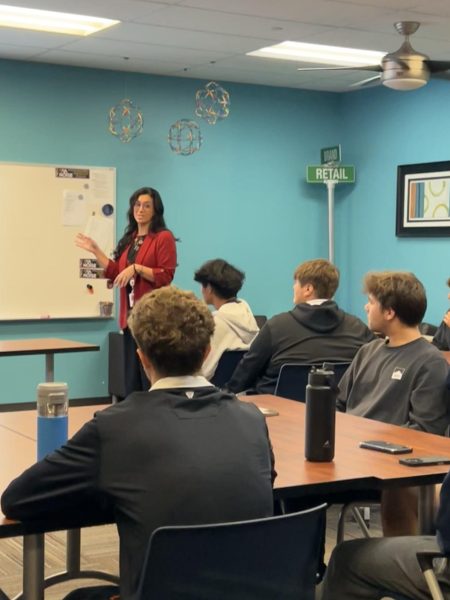The Costs of COVID
Beachwood reckons with increased costs and projected decrease in revenue
City of Beachwood Finance Director Larry Heiser in his office at City Hall
Communities around the country have been hit hard by COVID-19. The COVID relief bill that President Biden signed in early March includes hundreds of billions of dollars in aid to local communities, including cities and school districts like Beachwood.
Communities have been hurt both by increased expenses and declining tax projections due to the pandemic.
Beachwood Schools
In November, Beachwood City Schools Treasurer and Chief Financial Officer Michele Mills said the district had spent $373,117 in additional expenses related to COVID-19.
$189,497 of these expenses have been offset by federal grants, but the district has spent $183,619.66 above federal funds. This only makes up 0.45% of the school’s budget.
A major category of COVID-19 expense is heating, ventilation, air conditioning (HVAC) systems. These systems were upgraded across the district’s buildings to protect against COVID-19. Increased airflow can reduce exposure of the virus in the air. $144,990 has been spent to improve these systems.
Another effect of the pandemic is that the district has become much more reliant on online educational tools. As a result, Beachwood has had to increase technological expenses. In 2019, $180,852 was spent to add 18 WiFi access points to the high school alone, but more have been added since the pandemic began.
In 2020, the first broadband grant of $21,750 came in, allowing the district to add additional access points to all the buildings.
“The district just was notified of receiving an additional $21,750 which we will also use to expand wifi capabilities,” Mills said in November. This ended up changing to $23,057.64, and district access points and switches have already been added.
In addition to WiFi, the district has also purchased 244 chromebooks at a total of $59,616.52 to ensure that students have access to online learning. This money came from the $112,709.18 of the BWC rebate.
The BWC is the Bureau of Workers’ Compensation. “The State of Ohio felt that the BWC was holding onto too large of a balance from all employers and was directed to pay $8 billion in dividends to Ohio employers” Mills said.
Beachwood also implemented a notable software expense called Newsela, which cost Beachwood an extra $20k. The school also spent $3,500 on Kami and $4,800 on Edpuzzle.
Google Meet, the platform the Beachwood School District relies on for classes, is already free due to the district’s previous use of Google apps, though the school did spend $5,496 to upgrade to Google Enterprise.
Transportation costs have also increased. Due to COVID-19, the busing system has changed as a result of this year’s hybrid half day schedule and the requirement of social distancing.
In order to make this happen, more drivers have been hired. Drivers also have to work longer hours, which means that more of them receive full benefits including district health care.
A benefit students received this year is the free lunches they get to take home. Until June 2021, the federal government will pay for these lunches. However, the school experienced losses from the previous school year due to an unfunded mandate to distribute lunches to students during quarantine.
Despite shortened fall and winter sports seasons, coaches were still fully paid. However, the district is spending significantly less on extracurricular activities this year since clubs and teams are not traveling as much, and so less money needs to be spent on transportation.
Mills also explained that the district has spent more on meeting mental health services for both students and staff this year, as the isolation of quarantine has increased need.
Among other things, the district hired an additional full time counselor who splits time between Hilltop and Bryden.
Staffing has been a notable expense as a result of COVID-19. There has also been an increase in teacher absences due not only to teachers who have been sick, but also those who have had to quarantine due to potential exposure to the virus.
This has meant an increase in need for substitutes while the teachers are still paid. Not only is Beachwood having this issue, but so are the schools around us, which has made it difficult to find substitutes. Periods when the district went remote provided a temporary relief from this problem.
“We had seen a decline in subs starting in February, and that trend continues,” Mills wrote in an email.
After the vaccine was administered, fewer subs have been needed.
Though the stimulus bill has already been signed, the money has yet to reach the school. In addition, the district currently does not know how much they will be receiving.
The district will also receive funds from the Elementary and Secondary School Emergency Relief Fund, which provides funding for schools to help them through the pandemic.
“We will receive an additional $399 thousand in ESSER funds next year, but again we do not have indication of additional funding from the recently passed bill” Mills wrote.
City of Beachwood
Along with heavily impacting the school district, COVID-19 has also financially left its mark on the city, though Beachwood has managed better than expected.
The City of Beachwood’s Finance Director Larry Heiser advises the mayor and city council about finances, manages the budget and forecasts future income and expenditures.
“[Beachwood] could [have lost] as much as $6 million in 2020,” Heiser said in January. “By the end of the year, we ended up losing about $4.5 million.”
The main financial impact COVID-19 had was on the city’s revenue. Income tax, which usually brings in $32 to $33 million, is both the biggest revenue source and the hardest hit as businesses closed and unemployment rose with the onset of the pandemic.
Revenue from hotels and motels also suffered due to the lack of travel. Hotels and motels were previously the city’s second biggest source of revenue.
The revenue from the police department was also drastically reduced. Policemen stopped people less for minor infractions, such as expired license plates, since people were unable to update them.
Along with the police department, revenue from the hospital was also less than average during a normal year.
“EMS runs were down because fewer people were going to the hospital, so there was a lot less activity,” Heiser said.
Despite reduction in revenue, Beachwood did its best to keep finances stable. Originally, the city had planned to hire four new police officers, but delayed doing so, saving the city roughly $400,000.
The cancellation of recreational activities also saved the city money. Without the pool and summer camps closed over the summer, a lot of financial pressure was alleviated.
In 2018, Beachwood spent $1,141,130.66 on recreational programs, which dropped to $34,663.53 in 2019.
“We shut down a lot of programs, we left a lot of positions unfilled … It helped us make it through the year,” Heiser explained.
However, Heiser also predicts that Beachwood will lose $6 million by the end of 2021 if revenues do not recover. If that happens, the city will consider layoffs during June or July.
“If people like myself take one day unpaid every two weeks [it would help],” he said. “It doesn’t sound like a lot, but if you had forty people doing that, it’s enough savings over time.”
Beachwood also sold off part of the service garage for $2.7 million, but these funds are not being put towards the pandemic.
“The sale of the service garage is more about economic development, and although it will cost more to build a new service center, the new center will be more efficient and the [carbon] footprint will be significantly smaller,” Hesier wrote in an email.
“If people want to get their kids out [to attend camps] … that has a cost to it,” Heiser wrote. “We’ll figure out the cost of those camps to make it work so we cover our costs and it doesn’t cost the taxpayers.”
The federal government has also supported the city financially through the pandemic. Extra expenditures were mostly covered by $750,000 from the Cares Act. This money was put towards masks, temperature checks, hand sanitizer and wages.
Money from the federal government was passed down to the states and then redistributed to local governments based on a formula. This formula accounts for population, fund balance and the wealth of the population, and is used for both non-pandemic funds and the first COVID relief bill. Non-pandemic-related funds from this formula would give Beachwood $100,000, since Beachwood is relatively well off.
The Beachwood Fire Dept. also received $214,000 through a grant from the Federal Emergency Management Agency.
In January, Heiser was hopeful that the new administration would provide help to local governments.
“There’s probably going to be an appetite for them to give more money to local governments,” he said at the time. “The Republicans were holding that up, they did not want to give more money to local governments.”
This has proven to be true, with the signing of the stimulus bill. As a result, the city will receive $2,272,408. Currently, plans to use the money have not been made yet.
Another variable to consider for future city finances is a series of lawsuits filed by the conservative Buckeye Institute regarding whether Ohio cities can tax commuters who have been working from home in another city during the pandemic.
The most recent suit was filed April 8 against the City of Cleveland.
“I am conservative in not spending any of the funds until [these] court case [are] resolved around local income tax,” Heiser said, indicating that a negative outcome in these cases could cause a major setback for the City of Beachwood’s revenue.
Other than lost funds, COVID-19 will leave its financial mark in a few notable ways. Heiser forecasts that businesses lost will never come back. Workers who moved when they lost their jobs will not move back. Costly safety procedures will last a while due to the fear of contamination that the pandemic has left.
Heiser remarks the finance department supports other city services.
“Our job is to … coordinate from a financial standpoint.” As citizens of Beachwood, we can also support everyone by staying safe and not spreading the virus.
Evelyn Zhang started writing for the Beachcomber in fall of 2020. She is interested in covering news. When not writing for the Beachcomber, Evelyn likes...

Avery (they/them) started writing for the Beachcomber in 2020. They like to write features, particularly on topics related to diversity and how events...







![“My parents have always said that education is important. My parents are Chinese immigrants, I'm Chinese American, [and that's a] value that has always been ingrained in our community,” said Senior Lyndia Zheng, pictured with Tony Zheng](https://bcomber.org/wp-content/uploads/2025/10/DSC_4244-600x400.jpg)




